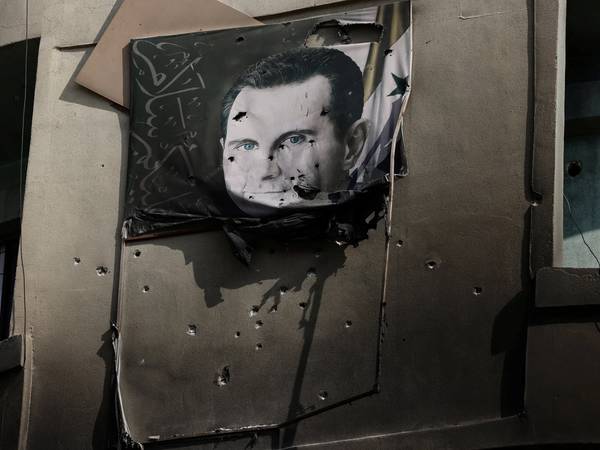Iranian officials have been offering conflicting rationales for Iran's hasty exit from Syria as establishment voices begin to come to terms with one of the Islamic Republic's biggest ever strategic setbacks.
Defenders of official policy even went as far as slamming Iran's top great power ally Vladimir Putin for saying 4,000 Iranian troops needed a Russian airlift to depart.
"Liar," government-controlled media Nameh News branded the Russian President.
A senior military figure protested that those airlifted to Tehran were not Iranian or were not military personnel. Still others have defended Iran's support for and defense of Assad and at least one has denied Iran's military presence in Assad's Syria altogether.
Ali Akbar Ahmadian the Secretary of the Islamic Republic's Supreme Council of National Security insisted that Iranian troops were present only as military advisers.
The statement is contrary to copious Iranian state TV footage in the past that showed Iranian IRGC forces engaged in combat in Syria.
"Iran's military presence outside the country is based on Tehran's national interests, non-intervention in the internal affairs of the host countries," Ahmadian added. "Iran never starts an invasion."
Iranian and Russia forces participated in large-scale assaults and air strikes against population centers, including Syria’s second largest city, Aleppo during the civil war.
The conflict involved government forces opposed by religious and secular opposition fighters. Assad was ultimately toppled by a rebel coalition spearheaded by a radical Islamist group that was once an Al Qaeda affiliate.
Ahmadian made a rare concession about the true nature of Iran's erstwhile ally, however.
"Part of Assad's political system showed a detestable behavior against the people of that country and that brought about a divide between the Syrian government and people."
Ebrahim Rezaei the spokesperson for the Iranian parliament's National Security Committee told the press that "Assad's regime would have fallen much earlier if it were not for our resistance."
"Iran's presence in Syria was aimed at protecting the axis of resistance rather than Assad as an individual," he added."We fought terrorists such as ISIS and some of our men were killed in action in Syria."
Islamic Revolutionary Guard Corps (IRGC) General Esmail Kowsari, a member of the Iranian parliament's National Security Committee said Tehran did not station so many troops in Syria to have needed a massive Russian airlift.
"Iran never had 4,000 troops in Syria. Those who were evacuated were Lebanese and Afghan military advisers as well as individuals from some other countries."
Iran organized Afghan, Pakistani and Iraqi militiamen to fight alongside Assads forces for a decade.
The Afghan fighters receive citizenship or residency in Iran and were buried there with honors when they were killed in Syria.
"The reason we did not evacuate them earlier was that we expected the Syrian army to show some resistance. But neither the army nor Bashar Assad did so," Kowsari added. "We even told Iranian teachers in Syria to return to Iran via Lebanon."
Iran's clerical establishment also sought to blame Assad's forces.
Hashem Hosseini Bushehri the Friday Prayers Imam of Qom and a member of the Assembly of Experts also said in one of his sermons: "Neither Bashar nor the Syrian army had any motivation to fight, and Iran was not able to do anything under the circumstances as Syria's ground and air borders were closed."
Iran had warned Assad, he said, that fighters were being trained in Idlib but Tehran's counsels fell on deaf ears.
